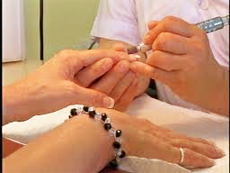fitness news
![]() ,
,![]()
Font size Beauty
Nail Salon Nightmare: Hepatitis B From Mani-Pedis
– Reported, January 5, 2012
 SAN DIEGO (Ivanhoe Newswire) –An estimated 4.4 million Americans are living with chronic hepatitis and most dont know it. Now a new study shows customers in nail salons could be putting themselves at risk for the deadly disease. Well show you what to watch out for.
SAN DIEGO (Ivanhoe Newswire) –An estimated 4.4 million Americans are living with chronic hepatitis and most dont know it. Now a new study shows customers in nail salons could be putting themselves at risk for the deadly disease. Well show you what to watch out for.
From polishing to cleaning, Nancye Swanson does her own nails these days. Six months ago, she almost died from something she picked up at a salon.
It felt like the flu, Nancye Swanson, a hepatitis B patient told Ivanhoe.
Her skin looked yellow, doctors told her that was a clear sign of hepatitis B a serious liver infection. It happened while she was getting a pedicure.
A lot of these places use sharp instruments and they could be re-using those, Robert Gish, M.D., a clinical professor at UC San Diego told Ivanhoe.
Dr. Robert Gish is writing a health policy for the Vietnamese government on the spread of hepatitis B. Thats because every person born in the Asian Pacific region are at a high risk of already having it. That includes the thousands of people working in salons across the U.S and they may not even know they are a carrier.
95 percent of people with hepatitis B have no symptoms. Thats the problem, Dr. Gish said.
While there is no curea pill once a day will control it. Thats what Nancye did.
I cannot believe I was that close to death, Nancy explained.
Here are some ways you can protect yourself at the salon. First, make sure your salons license is clearly posted. Scissors and clippers should be disinfected after each use and only disposable files should be used. The same goes for the pedicure bath and all suction screens in the tubs. Thats where deadly bacteria gets trapped. Also, look for labels on products. If you dont see one, they could be diluted. Also, always-take your own polish.
Its not just nail salons to watch out for. Dr. Gish says anyplace where you can get tattoos, ear piercing, body piercing, and even dental offices can put you at risk.
For More Information, Contact:
Robert G. Gish, MD
UC San Diego Health System
[email protected]
– WF Team